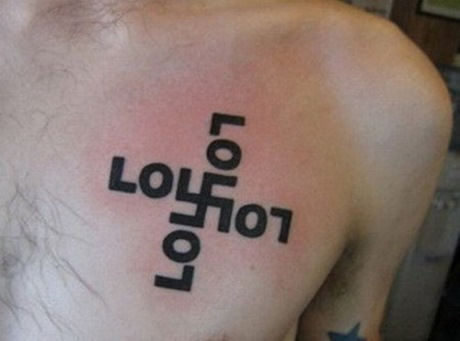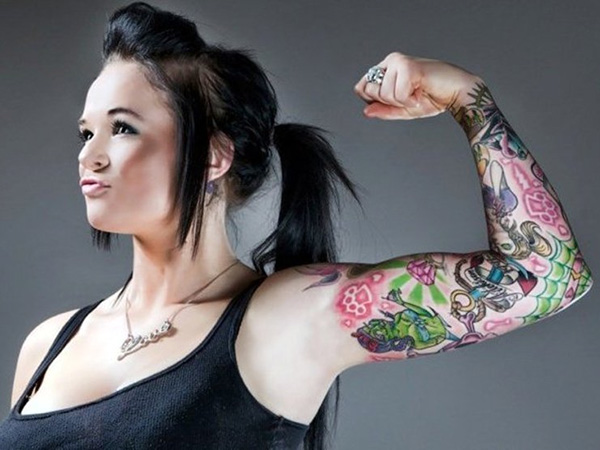Tattoos and facial piercings are taboo if you want a job, right? Not so fast. Conventional wisdom is starting to shift.
If you ever want to get a job, you can't have tattoos or anything other than your ears pierced. (And if you're male, you might want to skip the ear piercing as well.)
That's the conventional wisdom, right?
And truth be told, it's still not a bad idea. Unless you want a job where tattoos are the norm, not having a tattoo is never going to hurt you. It's not like someone is likely to say, "I'd really like to hire Jane to be my new marketing director, but her neck is surprisingly tattoo free."
But, times, they are a-changing. There are many companies where tattoos and piercings are not going to hold you back one bit.
Jim Whitehurst, president and CEO of Red Hat says, "Red Hat is an open organization, accepting of people and how they chose to express themselves. Whether you have tattoos or piercings, we want people to feel comfortable and free to be who they are here. In fact, we have at least three associates who are so passionate about our role in changing the world through open source technology they have gotten tattoos of our company logo: Shadowman. How many organizations can say the same?"
Now, that's some commitment to the company. It might make a future job interview a little awkward, though, so I can't say I recommend getting your current company's logo tattooed anywhere, but it demonstrates that you can be successful and appreciated for your ink.
Kirsten Davidson, Head of Employer Brand at Glassdoor, points out that lots of people look for companies that allow tattoos and piercings and general differences from the buttoned-down, traditional work attire.
While unemployment is still high, smart companies battle over the best talent. Davidson says, "Labeling something taboo is dangerous for workplace transparency. When we look at companies rated highly for culture & values on Glassdoor, we often see employee feedback about feeling comfortable bringing their whole selves to work, or feeling free to be authentic. Among our own employee base, we have found this to be true as well. When we encourage people to be themselves, we foster creativity and innovation that is essential for producing the highest quality work."
This does not mean that you should run out and get ink in a place that isn't easily covered up. Forty-two percent of people feel that visible tattoos are inappropriate at work.
That number, as you might expect, increases as the person ages and decreases for the younger population, with only 22 percent of 18 to 25-year-olds believing tattoos should be covered up in the workplace.
There are still negative attitudes towards tattoos, and you need to take that into consideration.
Of course, times are changing. In 2012, 21 percent of people had a tattoo. That number jumped to close to 40 percent for people between the ages of 18 to 29.
That survey was a while ago, so those tattooed 29-year-olds are now in their 30s and, undoubtedly, many are hiring managers themselves.
Chances are, they aren't going to be critical of an applicant's visible tattoos if they have them themselves.
Still, there are guidelines. If you want to work in a traditional stuffy organization, consider the following before getting a tattoo that would be visible in your work attire.
Stay Away From the Offensive
Anything that involves nudity or violence is a no-go. You're not going to get hired as a pharmaceutical sales rep with a visible skull with a knife through it on your arm.

It's just not going to happen. Your boss also doesn't want to deal with any sexual harassment claims when your coworkers get to see the naked person on your arm.
You won't get the job in that situation.
Consider the Extent of the Tattoo
Most people won't be bothered at all by your kids' birthdates, or a small picture that is important to you.

But if there is more ink than skin, that's going to be a harder sell.
Keep It Off the Face and Neck
Jane Marie wrote about her experience with "discrimination" when a tattoo artist refused to give her a neck tattoo.
She took great offense that they wouldn't let her do what she wanted with her own body. However, the tattoo artist, Dan Bythewood responded with his reasoning.

He writes: " As all tattooers know, a neck or hand tattoo is a big commitment, and traditionally are reserved for those heavily covered and ready to confront society on a daily basis as a heavily tattooed person. Although tattoos are more accepted now than ever, we are still judged daily for our appearance. A hand or neck tattoo may mean the difference between that next job or promotion, and also may spur daily judgmental looks and harassing comments from strangers as many of my friends have experienced. It’s not a thing to be taken lightly and I long ago drew an ethical line in the sand for myself as professional tattooer to turn down “job stoppers” on those who are not already committed to living as a heavily tattooed person."
No one knows better than a tattoo artist that people judge you on your appearance. You need to stop and think if the conclusions people will draw from you are accurate ones.
If they aren't, then consider holding off on that visible tattoo or piercing.